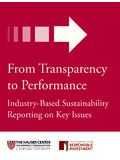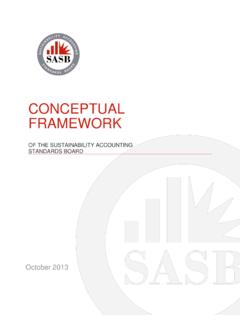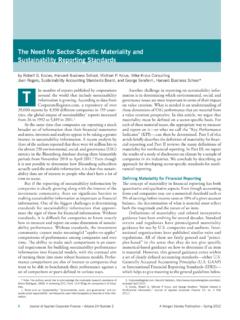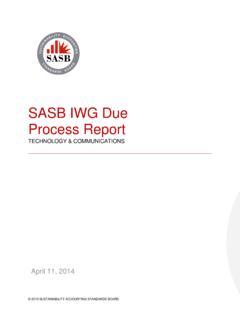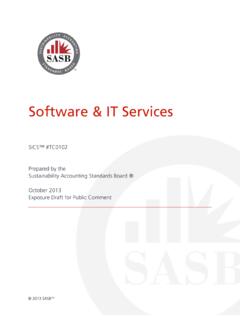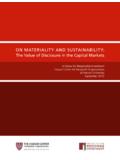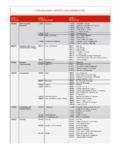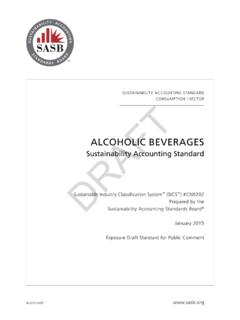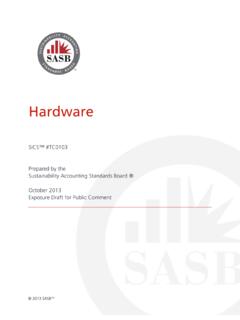Transcription of AUTOMOBILES - Sustainability Accounting …
1 TM Sustainability Accounting STANDARD TRANSPORTATION SECTOR AUTOMOBILES Sustainability Accounting Standard Sustainable Industry Classification System (SICS ) #TR0101 Prepared by the Sustainability Accounting Standards Board September 2014 Provisional Standard 2014 SASB Sustainability Accounting Standard About SASB The Sustainability Accounting Standards Board (SASB) provides Sustainability Accounting standards for use by publicly listed corporations in the in disclosing material Sustainability information for the benefit of investors and the public.
2 SASB standards ar e designed for disclosure in mandatory filings to the Securities and Exchange Commission (SEC), such as the Form 10-K and 20-F. SASB is an independent 501(c)3 non-profit organization. Through 2016, SASB is developing standards for more than 80 industries in 10 sectors. Sustainability Accounting STANDARDS BOARD 75 Broadway, Suite 202 San Francisco, CA 94111 The information, text, and graphics in this publication (the Content ) is owned by Sustainability Accounting Standards Board. All rights reserved. You may use the Content only for non-commercial and scholarly use, provided that you keep intact all copyright and other proprietary notices related to the Content, and that you make no modifications to the Content.
3 The Content may not be otherwise disseminated, distributed, republished, reproduced, or modified without the prior written permission of Sustainability Accounting Standards Board. To request permission, please contact us at Table of Contents Purpose & Structure .. 1 Industry Description .. 1 Guidance for Disclosure of Material Sustainability Topics in SEC Filings .. 2 Guidance on Accounting of Material Sustainability Topics .. 4 Users of the SASB Standards .. 4 Scope of Disclosure .. 5 Reporting Format .. 5 Activity Metrics and Normalization .. 5 Units of Measure .. 6 Uncertainty .. 6 Estimates .. 6 6 Limitations.
4 6 Forward-looking Statements .. 7 7 Table 1. Sustainability Disclosure Topics & Accounting Metrics .. 8 Materials Efficiency & Recycling .. 9 Description .. 9 Accounting Metrics .. 9 Product Safety .. 12 Description .. 12 Accounting Metrics .. 12 Notes .. 14 Labor Relations .. 15 Description .. 15 Accounting Metrics .. 15 Fuel Economy & Use-phase 16 Description .. 16 Accounting Metrics .. 16 Notes .. 17 Materials Sourcing .. 18 Description .. 18 Accounting Metrics .. 18 INTRODUCTION Purpose & Structure This document contains the SASB Sustainability Accounting Standard (SASB Standard) for AUTOMOBILES . SASB Standards are comprised of (1) disclosure guidance and (2) Accounting standards on Sustainability topics for use by and foreign public companies in their annual filings (Form 10-K or 20-F) with the Securities and Exchange Commission (SEC).
5 To the extent relevant, SASB Standards may also be applicable to other periodic mandatory filings with the SEC, such as the Form 10-Q, Form S-1, and Form 8-K. SASB s disclosure guidance identifies Sustainability topics at an industry level, which may be material depending on a company s specific operating context to a company within that industry. Each company is ultimately responsible for determining which information is material and is therefore required to be included in its Form 10-K or 20-F and other periodic SEC filings. SASB s Accounting standards provide companies with standardized Accounting metrics to account for performance on industry-level Sustainability topics.
6 When making disclosure on Sustainability topics, companies adopting SASB s Accounting standards will help to ensure that disclosure is standardized and therefore useful, relevant, comparable, and auditable. Industry Description The AUTOMOBILES industry includes companies that manufacture passenger vehicles, light trucks, and motorcycles. Industry players design, build, and sell vehicles that run on a range of traditional and alternative fuels and powertains. Auto makers sell vehicles to dealers for consumer retail sales as well as selling directly to fleet customers, including car rental and leasing companies, commercial fleet customers, and governments.
7 Due to the global nature of this industry, nearly all market players have manufacturing facilities, assembly plants, and service locations in several countries around the world. The AUTOMOBILES industry is highly concentrated, with a few large manufacturers and a large number of auto parts manufacturers feeding the supply chain. 2014 SASB Sustainability Accounting STANDARD | AUTOMOBILES 1 Guidance for Disclosure of Material Sustainability Topics in SEC Filings 1 . Industry-Level Sustainability Disclosure Topics For the AUTOMOBILES industry, SASB has identified the following Sustainability disclosure topics: Materials Efficiency & Recycling Product Safety Labor Relations Fuel Economy & Use-phase Emissions Materials Sourcing2.
8 Company-Level Determination and Disclosure of Material Sustainability Topics Sustainability disclosures ar e governed by the same laws and regulations that govern disclosures by securities issuers generally. According to the Supreme Court, a fact is material if, in the event such fact is omitted from a particular disclosure, there is a substantial likelihood that the disclosure of the omitted fact would have been viewed by the reasonable investor as having significantly altered the total mix of the information made available. 1,2 SASB has attempted to identify those Sustainability topics that it believes may be material for all companies within each SICS industry.
9 SASB recognizes, however, that each company is ultimately responsible for determining what is material to it. Regulation S- K, which sets forth certain disclosure requirements associated with Form 10-K and other SEC filings, requires companies, among other things, to describe in the Management s Discussion and Analysis of Financial Condition and Results of Operations (MD&A) section of Form 10-K any known trends or uncertainties that have had or that the registrant reasonably expects will have a material favorable or unfavorable impact on net sales or revenues or income from continuing operations. If the registrant knows of events that will cause a material change in the relationship between costs and revenues (such as known future increases in costs of labor or materials or price increases or inventory adjustments), the change in the relationship shall be disclosed.
10 2 Furthermore, Instructions to Item 303 state that the MD&A shall focus specifically on material events and uncertainties known to management that would cause reported financial information not to be necessarily indicative of future operating results or of future financial condition. 2 In determining whether a trend or uncertainty should be disclosed, the SEC has stated that management should use a two-part assessment based on probability and magnitude: First, a company is not required to make disclosure about a known trend or uncertainty if its management determines that such trend or uncertainty is not reasonably likely to occur.
